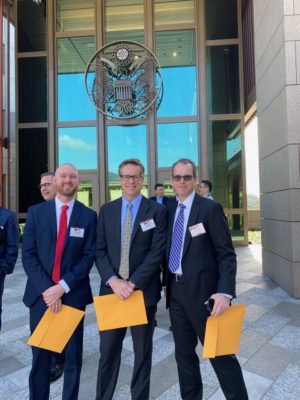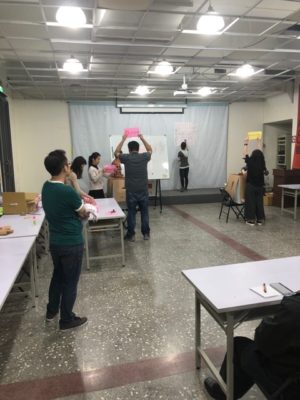Political Science Faculty Join Academic Delegation to Observe Watershed Taiwanese Election
Faculty from the Department of Political Science traveled to Taiwan in January to witness one of the country’s most significant presidential elections to date. Professor Josh Clinton, Associate Professor Brett Benson, and Assistant Professor Brad Smith were part of a larger academic delegation invited by Taiwan’s Ministry of Foreign Affairs. The ministry’s goal was to provide a nonpartisan opportunity for scholars to enrich their research by observing Taiwan’s electoral process in action. Participants came from a variety of universities, think tanks, government offices, and other entities around the U.S.

In addition to observing activities on election day, the delegation followed a packed itinerary designed to provide a comprehensive view of the Taiwanese electoral process. The scholars toured headquarters for all four Taiwanese political parties, met with campaign staff and attended rallies for the two largest parties, visited Taipei’s top high school, and met with officials from the Taiwanese national security council and Ministry of Foreign Affairs. The election was significant because it resulted in a second term for Taiwan’s incumbent president, Tsai Ing-wen of the Democratic Progressive Party. Her primary opponent, Han Kuo-you, had campaigned on a platform of closer political and economic ties to China.
For Josh Clinton, who holds the Abby and John Winkelreid Chair in the American Presidency and specializes in U.S. presidential elections and public opinion polls, the trip provided a unique opportunity to consider how certain electoral-process issues play out across democracies.

“Our hosts were interested in [the group’s] opinions about how to deal with misinformation among their electorate and the role of social media in shaping public opinion about candidates. We got to talk about experiences we’ve had in the U.S. and how they can apply that in their situation,” Clinton said.
According to Clinton, the U.S., Taiwan, and other democracies also share common ground when it comes to wrestling with the accuracy and value of pre-election polls and concerns about outside intervention in elections. The trip allowed Taiwanese officials and U.S. delegates to discuss the factors that influence public polling and share methods for maintaining ballot integrity.
Overall, Clinton was intrigued by the fact that Taiwanese pre-election polls “pretty much nailed the outcome” of the election. The situation helped him appreciate how polling works in diverse circumstances, particularly where re-election is involved.
Brett Benson, a leading scholar on Asian politics, regularly visits China for research and to recruit international students to Vanderbilt. For him, the trip was an unusual opportunity to compare electoral turnout and demographics between Taiwan and the U.S. In Taiwan, overall voter turnout was a whopping 75 percent, compared to 60 percent in the last U.S. presidential election—and in a democracy where, Benson said, “it’s really costly to vote.” Taiwanese citizens must vote in the towns where they were born, and expatriates must register there in person at least six weeks before the election. In addition, every voter must produce two forms of ID and a special stamp for verification.

Second, Benson said, “young people basically steered the process.” Taiwan saw an overwhelming turnout of young voters, significantly more than usual and more than the U.S. typically sees among its younger population. Young Taiwanese voters also gave a significant amount of their time to assist with the electoral process—again, a role usually filled by older citizens in the U.S.
“Young people were at the rallies, they volunteered at polling stations to help other people vote, and they helped in the vote-counting process,” Benson said.
Since his work focuses heavily on China, Benson also paid special attention to the election’s reflection of and implications for China-Taiwan relations. In particular, he learned more about how economic dependence on China affects political independence—not just for Taiwan, but also for countries such as the U.S.
Brad Smith focused on yet another trend. While the European and American electorates tend to view domestic and foreign policy as completely separate matters, he said, the trip showed him that Taiwanese voters and politicians tend to integrate the two.
“It was amazing the degree to which international considerations figured in the minds of voters. It’s an extremely salient issue in their domestic politics,” he said.
Because of this realization, Smith came away from the trip determined to expand his research. He previously focused on the history of Taiwanese national security, but he intends to pay closer attention to contemporary Taiwanese politics going forward.
Overall, the trip was an object lesson in the fact that, while political processes may vary, democratic governments worldwide are striving toward the same goals and face some of the same challenges.
“It was a really eye-opening experience to see an election in a developing democracy: how people conducted campaigns, how candidates positioned themselves,” Clinton said. “There are things they’re seeing that help inform how we understand politics, and vice versa.”
